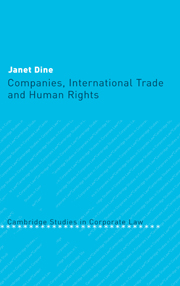Book contents
- Frontmatter
- Contents
- Preface
- Table of statutes, agreements, convenants and treaties
- Table of cases
- List of abbreviations
- 1 A global crisis?
- 2 Why we are here
- 3 The institutional framework
- 4 Relationship between companies and human rights law
- 5 Corporate social responsibility
- 6 Understanding property rights: companies, states and the duty of international co-operation
- Bibliography
- Index
4 - Relationship between companies and human rights law
Published online by Cambridge University Press: 10 March 2010
- Frontmatter
- Contents
- Preface
- Table of statutes, agreements, convenants and treaties
- Table of cases
- List of abbreviations
- 1 A global crisis?
- 2 Why we are here
- 3 The institutional framework
- 4 Relationship between companies and human rights law
- 5 Corporate social responsibility
- 6 Understanding property rights: companies, states and the duty of international co-operation
- Bibliography
- Index
Summary
This section of the book turns from looking at the problems within the international trading system to considering solutions which have been suggested. One growing debate suggests that human rights law might provide some control over the power wielded by companies and provide some answers to the abuses of human rights which occur within the trading system, such as poor labour standards. This has triggered a debate in which companies seek to claim rights as well as be subjected to duties to respect rights. This chapter considers the possibility of using human rights law to control companies, either by imposing direct duties on them or by subjecting them to control via states' obligations or obligations on the international financial institutions (IFIs). It also looks at the complexities of claims to rights by companies.
There are a number of significant problems in choosing human rights law to impact on companies. They are:
the civil and political rights versus economic and social rights controversy;
reaching a proper understanding of ‘rights’;
the international legal systems and international institutions which are heavily state-orientated; and consequently
the ways in which corporations can (or cannot) be seen as duty holders and as human rights violators;
direct and indirect routes to the imposition of human rights obligations on companies;
the possibility of human rights standards being inserted into the decision-making of the IFIs and the IMF;
can companies claim rights?
- Type
- Chapter
- Information
- Companies, International Trade and Human Rights , pp. 167 - 221Publisher: Cambridge University PressPrint publication year: 2005

